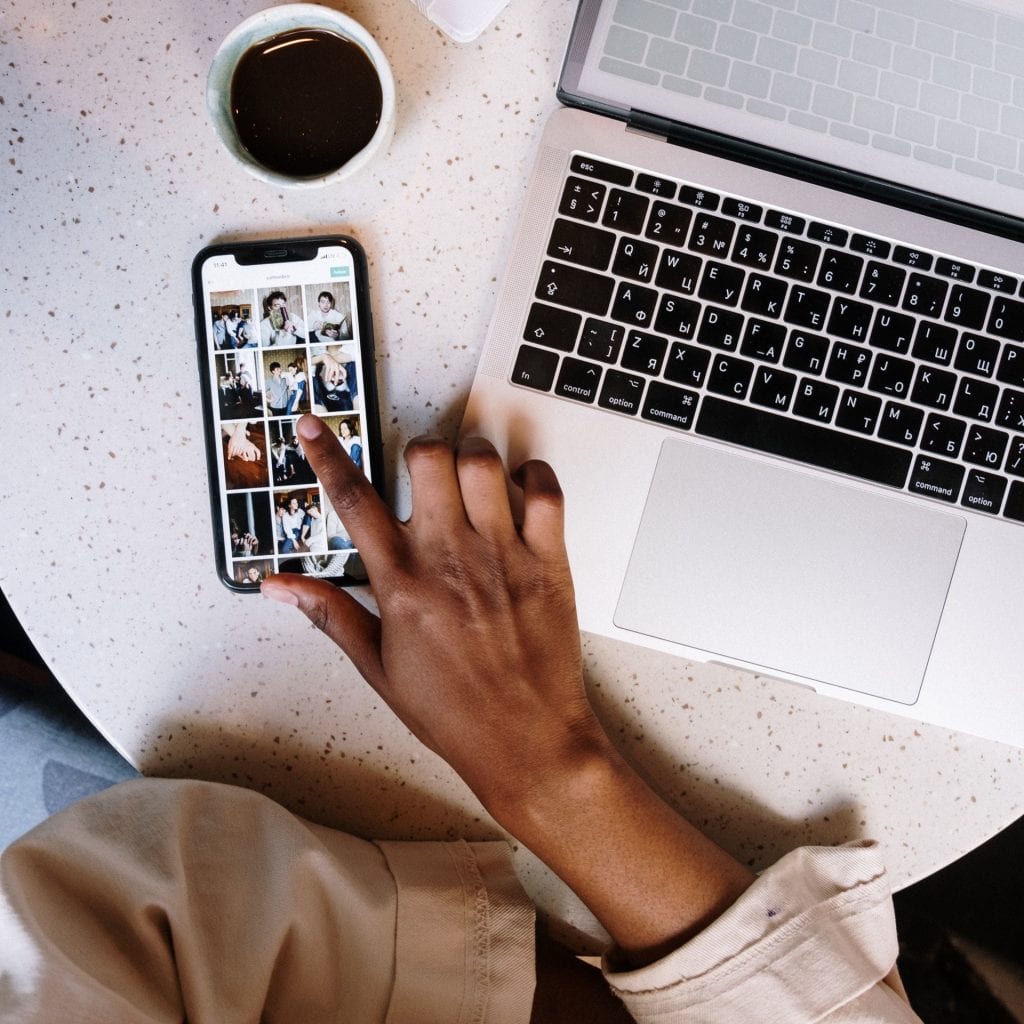
Let’s start with the very definition: FOMO (fear of missing out). It is a real psychological phenomenon. In fact, the Oxford English Dictionary added FOMO as an actual word in 2013. But, what exactly is FOMO and why is it important to us as moms? How is this pandemic impacting this phenomenon? Collectively, moms are so tired and the word stressed doesn’t begin to describe the various meltdowns we’ve had over the last nine months. The photo above is intended to elicit an emotional response as an example of FOMO – doesn’t a small part of you wish you were there? Lauren Schifferdecker of Inspire Counseling Center in Northbrook delves into the response behind FOMO and how we tired and over-stressed mamas can deal with it.
– Words by Lauren Schifferdecker, LCPC, TEDx speaker and owner of Inspire Counseling Center
Defining FOMO

Most people associate FOMO with social media. Thanks to Instagram, Facebook, Snapchat, TikTok, we can now see fun events happening in real time while we sit at home by ourselves. Just 15 years ago, if you missed out on a fun event, you might hear about it on Monday. You also might not ever hear about it. If you heard about the event, it would be from someone who was there. That person would likely tell you the real story– what was fun and what wasn’t fun. You’d get to hear the context of how and why the event happened and the drama behind the scenes. Also, in that conversation you’d have connection with the person who was telling you the story.
Today, when we see other fun things happening on social media, there’s no connection. There’s no reality or explanation of the event. You only see the best pictures showing the best moments—all while you’re not there. Even as adults, this bothers us at some level.
Everyone feels this. Even as a psychotherapist, I vividly remember where I was standing in my kitchen when I casually scrolled through Facebook and saw a picture of a few of my friends in a limo on their way to dinner in the city (long before the pandemic). I had no idea it was happening. I didn’t know why I wasn’t invited. I saw beautiful smiles, great outfits, awesome hair, and a fun event that was happening as I was standing there in my sweats making dinner for my kids. It took my breath away. I was instantly hurt.
The picture felt like an adult version of “nanny-nanny-boo-boo, we’re having so much fun”. I didn’t ask helpful questions or reality-test. My thoughts went straight to “Why wasn’t I invited?” “Why don’t they like me?” “What am I doing tonight?” Oh right – nothing.
It’s embarrassing to admit, even as a psychotherapist, I let it ruin my mood for the night. I felt so sad and hurt. If I’m honest, I felt like a loser. Thinking now about this event, I still feel my chest get a little tight. That’s because we are human.
During this pandemic, you would think we’re not supposed to get FOMO because there’s nothing technically to miss out on. We’re all supposed to be at home. But, unfortunately that’s not how it works.
In fact, I’d argue that FOMO is happening even more than usual, because it’s based on the fear of missing out – not the reality of missing out. While we’re home more, with less actual social connection, and more social media – it’s a perfect storm for FOMO.
For example, I was looking out the window from my home office and I saw a couple of moms walking together. No big deal. In my normal life, I wouldn’t think TWICE about something like that. I didn’t even know these women, but I instantly felt a panic that I was missing out.
My brain was in overdrive because I am missing out on connection. Can you imagine if I ran outside and said, “Hey! I know we’ve never met, but why didn’t you ask me to walk with you?” LOL!!! But, that’s honestly what my brain was telling me. You’re being left out!
Why do we have FOMO?

FOMO happens because humans are designed for connection. In fact, our very survival is designed for connection—even as adults. It might sound silly, but the phenomenon of FOMO is very real. It’s also something we need to be prepared for as social media isn’t going anywhere anytime soon.
FOMO goes much deeper than just feeling like we’re missing out on something fun. It taps into our unconscious mind, which is wired for survival. FOMO feels like a real threat to our survival of life and death.
Our survival depends on people. When you were in the infant/toddler stage, your sole job was to bond with your primary caregiver. You needed your person for every, single, thing to stay alive because, simply put, a baby cannot survive without someone else feeding, changing, holding, loving and teaching it. Our brains know that. From the moment we are born we need people.
As you get older, you might be tempted to think that you don’t need people as much. Perhaps you make a great income, take good care of yourself, take care of your family, you are able to eat, dress, cook, and care for yourself and others. These are all great points — but I’d like you to picture yourself on an island with no one else. No doctors, no farmers, no cooks, no builders, no seamstresses, no one to protect you – just how long do you think you’d last? Exactly. Don’t be fooled by our reality TV shows, although entertaining, the reality is you wouldn’t last long. Our brains know that.
The human species is not designed to survive alone. We need each other. This goes beyond physical shelter, protection, and physical health – we need each other for emotional connection too. We need love, laughter and connection just as much!

Research from Harvard and Brigham Young University shows us there are health risks for loneliness—and these risks are comparable with smoking and obesity as you age.
Further research from the UK at University of York shows loneliness increases a person’s average risk for coronary heart disease and stroke by 50 percent, which are the two biggest health burdens in higher-income countries.
We need connection for our survival and physical health even as adults. When we feel like we are getting left out, deep below the surface, our brain is worried for our survival.
This is not good for us during the pandemic. While we wait for vaccines and drug therapies, and stay isolated from friends, family and social connections, our brains are on HIGH ALERT for our survival.
What do we do about FOMO?

While I don’t recommend chasing down strangers and begging to go on a walk with them, there are a few tips that can help us all get through FOMO together:
1) Acknowledge your feelings. Knowledge is power. The first thing we can do is to notice your feelings. Many of us therapists use the phrase, “Name it to tame it.” That’s because when you can name a feeling, it reduces the power it has over you. When you feel something, sad angry upset, etc. it moves the experience in your brain from something unconscious to something it understands.
2) Remind yourself you’re not the only one who feels this. You are not alone. Everyone feels what you are feeling right now at some point in their life. Even if it doesn’t make sense, if you’re feeling left out – talk to yourself and brain and say, “everyone feels this sometimes, I’m not alone.” Some common questions and feelings people have when they are feeling left out:
• Did they post this picture just so I would see it?
• Did they do this on purpose?
• Why don’t people like me?
• Why didn’t I get invited?
• Are people trying to hurt my feelings?
• Do I have any real friends?
• Is everyone having more fun than me?
• What am I missing out on?
If you find yourself asking any of these questions, remind yourself you are not alone. Also, it’s helpful to remind yourself that usually it’s not about you as much as it feels like. If people are trying to brag or show off all the fun they’re having, it is usually because they feel insecure themselves.
3) Connect with someone. Reach out to a trusted person in your life whether it’s a friend, your mom, dad, sister, partner, therapist – someone who cares about you and someone who makes you feel safe. Connection is the antidote for loneliness and FOMO. Connection can look like a lot of things— a laugh, a hug (even if virtual), a good cry, a reality test or a vulnerable conversation. Good news, these things don’t have to happen in-person. We have lots of technology to see and hear people all over the world.
For me, after I saw the Facebook post of my friends going to a fun dinner in the city, I felt so sad, that I chose the vulnerable conversation route. I reached out to my friend and admitted I saw the post. I also shared that I felt sad and left out.
Those types of conversations are not always necessary, and are best to be handled delicately. I have learned so much from my own therapist in how to have vulnerable conversations that lead toward connection and love, instead of more hurt feelings.
I started by assuming goodwill. I shared my thoughts and feelings. I stayed open to hear her thoughts and feelings. I started off by reminding my friend she had done nothing wrong by going out to dinner without me—no crime has been committed here. However, it was important for our friendship that I let her know I felt sad about it. In that conversation, she was able to help me understand the context of the event, the circumstances, the reality. Most important of all, in that conversation – we connected. I felt so much better, in an instant.
Again, not all feelings of FOMO require that type of conversation.
But, it’s still important you find some way to connect.
Reach out to someone for a laugh, a chat, go for a walk together, anything to remind yourself you are not alone. You are loved. You matter. You are precious. You are a unique and important part of this world.
 Lauren Schifferdecker is a TEDx speaker who grew up in Northbrook and is now raising her family and business, Inspire Counseling Center, in her hometown. Inspire is a fast-growing group counseling practice with nearly 20 therapists, conducting almost 20,000 sessions for thousands of local moms, couples, families, children and adolescents. They are in-network with three major insurances and are accepting new clients virtually and in-person. Lauren has a huge heart for the community and helping people live their best lives! www.inspirecounselingcenter.com @inspire_counseling
Lauren Schifferdecker is a TEDx speaker who grew up in Northbrook and is now raising her family and business, Inspire Counseling Center, in her hometown. Inspire is a fast-growing group counseling practice with nearly 20 therapists, conducting almost 20,000 sessions for thousands of local moms, couples, families, children and adolescents. They are in-network with three major insurances and are accepting new clients virtually and in-person. Lauren has a huge heart for the community and helping people live their best lives! www.inspirecounselingcenter.com @inspire_counseling
